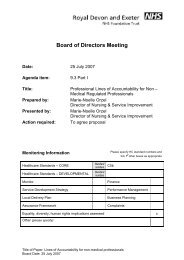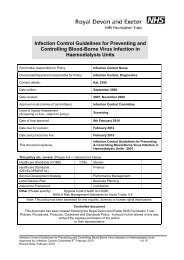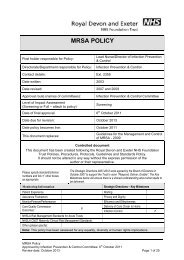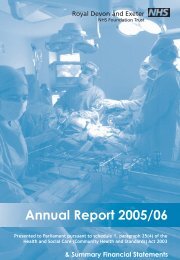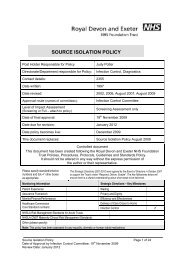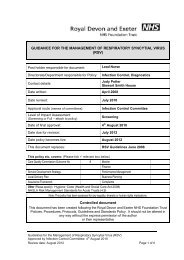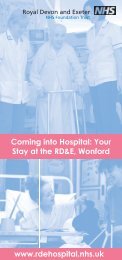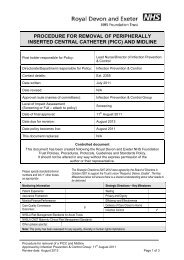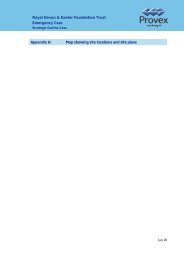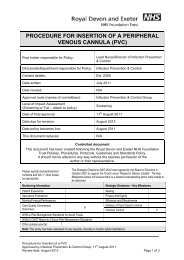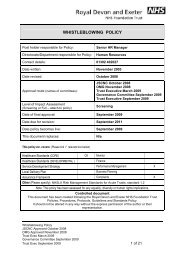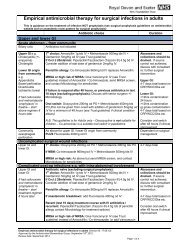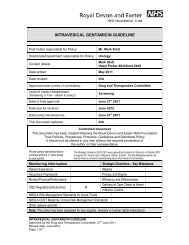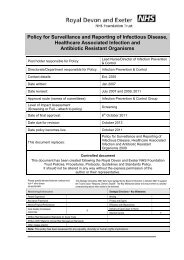Annual Report and Accounts 2012/13 - Royal Devon & Exeter Hospital
Annual Report and Accounts 2012/13 - Royal Devon & Exeter Hospital
Annual Report and Accounts 2012/13 - Royal Devon & Exeter Hospital
Create successful ePaper yourself
Turn your PDF publications into a flip-book with our unique Google optimized e-Paper software.
72 4. Our Governance<br />
<strong>Royal</strong> <strong>Devon</strong> <strong>and</strong> <strong>Exeter</strong> NHS Foundation Trust<br />
<strong>Annual</strong> <strong>Report</strong> <strong>and</strong> <strong>Accounts</strong> <strong>2012</strong>/<strong>13</strong><br />
Board effectiveness<br />
<strong>and</strong> evaluation<br />
The RD&E Board has continued on its<br />
development journey during the year.<br />
Collectively, the Board underst<strong>and</strong>s<br />
that to conduct its business effectively<br />
<strong>and</strong> to ensure that it fulfils its<br />
obligations as the body responsible<br />
for all aspects of the performance<br />
of the Trust, it needs to maintain an<br />
approach of continuous improvement<br />
in what it does, how it does it <strong>and</strong> the<br />
culture <strong>and</strong> behaviours that underpin<br />
performance.<br />
Over the year, the Board uses the<br />
time it has available to transact its<br />
core business as a Board but also to<br />
spend time ensuring that it has the<br />
opportunity to consider, reflect on<br />
<strong>and</strong> improve its own performance; to<br />
have more wide-ranging discussions<br />
about issues that are impacting on<br />
the Trust within the context of the<br />
Trust’s corporate strategy; <strong>and</strong> to<br />
receive briefings on key issues or<br />
developments in the NHS <strong>and</strong> in<br />
healthcare more generally.<br />
To enable this to happen, the Board<br />
held four development/strategy days<br />
during the year (as well as a joint<br />
session with the Council of Governors).<br />
In addition to this, the Board agreed<br />
that from May <strong>2012</strong> it would move<br />
its Board meetings to the afternoon<br />
to enable the whole of the morning<br />
sessions to be devoted to strategic<br />
discussions <strong>and</strong> Board development.<br />
This has undoubtedly helped the Board<br />
focus its attention on maintaining a<br />
strategic approach to its work <strong>and</strong><br />
reasonable balance with the necessary<br />
work it undertakes on performance,<br />
operational issues <strong>and</strong> compliance. As<br />
well as re-balancing its schedule, the<br />
Board has tried out different ways of<br />
operating – for example by keeping<br />
verbal introductions to Board papers to<br />
a minimum, <strong>and</strong> adopting a new Board<br />
paper template – to ensure that it is<br />
being as effective as possible.<br />
Over the year, the Board has also<br />
focused its attention on developing<br />
the Board Assurance Framework (BAF)<br />
in order to focus on underst<strong>and</strong>ing<br />
<strong>and</strong> mitigating risks to the corporate<br />
strategy as well as using the BAF to<br />
drive the Board agenda.<br />
Some of the issues the Board<br />
addressed in these development/<br />
strategy sessions included:<br />
• <strong>Annual</strong> Plan <strong>and</strong> contracting issues<br />
• Changes to the compliance<br />
framework <strong>and</strong> implications<br />
• Developing the Trust’s Corporate<br />
Strategy<br />
• The Board Assurance Framework<br />
• Board effectiveness<br />
• A seminar on E-Notes.<br />
In January 20<strong>13</strong> the Board<br />
commissioned a consultancy (Board<br />
Intelligence) to undertake an external<br />
evaluation of Board effectiveness <strong>and</strong><br />
what lessons could be learned to<br />
continue the ongoing development of<br />
the Board.<br />
The review focused on a collective<br />
analysis of the effectiveness of the<br />
main Board (rather than committees<br />
<strong>and</strong> other governance structures)<br />
using feedback forms the Board itself<br />
had undertaken through an online<br />
self-evaluation survey, independent<br />
observation of the Board meeting,<br />
seminar <strong>and</strong> a review of its key<br />
materials, <strong>and</strong> a seminar conducted<br />
with Board Members. The purpose of<br />
undertaking an external evaluation<br />
was based on good practice drawn<br />
from the direction set out in the UK<br />
Corporate Governance Code (2010)<br />
which recommends that all FTSE 350<br />
companies undertake an externally<br />
facilitated Board evaluation at least<br />
every third year.<br />
The evaluation concluded that the<br />
Board compares well with similar<br />
organisations: “The RD&E Board is an<br />
engaged <strong>and</strong> well-functioning Board<br />
that compares favourably to its peers<br />
within the NHS <strong>and</strong> other listed or<br />
privately owned organisations. We<br />
were struck by the how well the Board<br />
works together as a team, with the<br />
Board Members all having air-time<br />
to question <strong>and</strong> provide constructive<br />
input to agenda items. There was<br />
a positive atmosphere in the Board<br />
meeting <strong>and</strong> we observed a healthy<br />
dynamic between Board members."<br />
"The RD&E Board<br />
is an engaged <strong>and</strong><br />
well-functioning Board"



